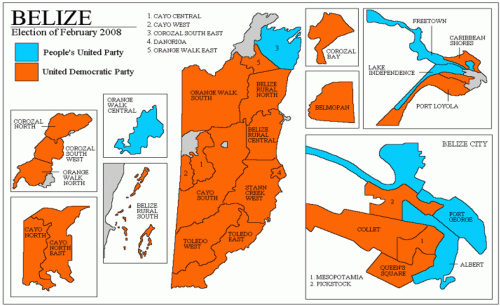The newly proposed electoral map for Belize is unconstitutional because it deprives Belizean citizens living in the United States and abroad a constituency and representation in the House of Representatives.
by Wellington C. Ramos
Wednesday, July 12, 2023
When the Belize Peace Movement (BPM), the Belize Progressive Party (BPP) and other interested parties brought their case to the Supreme Court against the Belize Government, they did it because the government of Belize was in violation of the Section-90 (1) (a) of the Belize Constitution for many years under the UDP and PUP administrations for having huge disparities in the number of registered voters in Belize’s various constituencies, and they were still conducting General Elections.
The Belize Peace Movement’s (BPM) lawyer, Arthur Saldivar’s claim is that under Section 90(1) of the Constitution it is clear: “The Elections and Boundaries Commission shall, after considering the distribution of the population throughout Belize, make proposals from time to time for dividing Belize into electoral divisions in such a way that (a) Each electoral division shall have as nearly as may be an equal number of persons eligible to vote”; and its case before the court aims to compel the Government of Belize to maintain that equality to its closest margin. A census is done in Belize every ten years, like in most countries. Whenever the census is completed, the Government of Belize must take the census report and identify how many Belizeans live in the country and create constituencies based on the census report.
A census was supposed to have been conducted in Belize in 2020, but due to the Covid-19 pandemic, it was postponed until 2022. The results from this last census was released recently, and according to the report there were changes and an increase in the Belize population. In this new map, Stann Creek West will be divided into Stann Creek North and Stann Creek South, so Stann Creek District will gain one seat, increasing their number to three.
Since 1961, the Stann Creek and Toledo Districts have not gained any additional seats, while all the other districts were gaining new seats, leaving these two districts with just two seats each. Belize City will lose two seats, namely: Port Loyola and Queen’s Square. Mergers will be done with some of the constituencies in Belize City to qualify some.
Belmopan, which is in the Cayo District, will be divided into two seats, and a new seat will also be created from one of the existing constituencies in the Cayo District, so this district will gain two more seats. Another seat will be made out of one of the constituencies in Orange Walk District, so they will gain an additional seat. The total number of seats that will be available for the next General Election in 2025, if this Electoral Map is approved, will be thirty-three (33).
The diaspora vote
Since becoming an independent nation on September the 21st 1981, the Belize governments, under the leadership of the People’s United Party (PUP) and the United Democratic Party (UDP), have both failed to grant their Belizean citizens living in the United States and abroad, their right to vote by proxy in the Belize general elections and to be a Representative in the Belize House of Representatives.
In 2019, the Belize National Assembly passed a law which stipulates that, if a Belizean citizen is living abroad and he or she wants to vote in the ICJ Referendum, he or she must show proof that they have lived in Belize for a period of not less than two months prior in order for them to meet the qualification to vote as a citizen of Belize.
This is despite the fact that the Government of Belize representatives know that most Belizeans who live in the United States and abroad will not leave the United States or the country where they are currently residing, just to qualify to vote as citizens of Belize. This law is also in contradiction with the Belize Constitution that states that all the citizens of Belize have the right to vote after they reach the age of 18 years.
The Belizean citizens living in Belize voted to take the Guatemalan dispute to the ICJ, but the residency law that the Belize government passed is still being enforced. The UDP Government of Belize did not want the Belizeans living in the United States and abroad to vote in the Referendum because they feared that they would have lost the Referendum vote. The denial of Belizeans’ right to vote in the Referendum angered many Belizeans, as is mentioned below in this legal opinion by lawyer Jessica Habet:
Disenfranchisement in Belize: Suppressed right to vote in a duplicitous democracy

by Jessica Habet
02/15/2019 / TWOCANVIEW LLC
Canadians who lived abroad for more than five years were once unable to vote in federal elections. A recent Supreme Court of Canada (“SCC”) decision explained why the law disenfranchising these Canadians was unconstitutional. This post is to add to the discussion regarding Belizeans abroad and their ability to vote in the upcoming referendum on whether we should take the Belize-Guatemala dispute to the International Court of Justice (“ICJ referendum”).
Belizeans who would like to vote in the ICJ referendum must reside in Belize for at least two months. This residency requirement disqualifies many in the diaspora who would like to participate in the referendum.
The right to vote is a core and fundamental feature of any democracy. The right of citizens to take part in the government of their country is so important, it is included in the Universal Declaration of Human Rights.
In deciding that the residency requirement was unconstitutional, Canada’s Chief Justice shared the story of Canada’s progressive enfranchisement. The right to vote was once restricted to property-owning men aged 21 or older. Women, racial minorities, individuals formerly described as having a “mental disease”, penitentiary inmates, Canadians abroad in service of Canada’s armed forces and public administration were all once excluded but now have the right to vote. Civic participation, he explained, is fundamentally important to the health of a free and democratic society.
“Residency” was the last restriction on the right to vote. The SCC analyzed the role of residence in Canada’s electoral system. The residency requirement emerged when citizens were generally unable to travel as easily and extensively as they do today and tended to spend their lives in one community. At that time, the right to vote was linked to the ownership of land, and only male property owners could vote. The requirement was designed, in part, to prevent “plural voting,” where a person who owned property in several electoral divisions could cast a vote in each of them.
Cue globalization and feminism. Today, the right to vote is no longer limited to male property owners. And as the Chief Justice wrote, “…citizenship, not residency, defines our political community and underpins the right to vote.”
Historically, Belizeans who “go da farin” continue to support their families at home. They move for more economic opportunity and often contribute to the economy of Belize. This trend is not isolated to Belizeans. In fact, migrants from Latin America and the Caribbean sent record amounts of money to their home countries in 2016, when remittance flows around the world decreased. The contribution of the Belizean diaspora to the Belizean economy is not to be dismissed. The government via the Attorney General of Canada argued that it would be unfair to allow non-residents to vote – it would be unfair if those who are largely unaffected (non-residents) participated in decisions that would affect others (residents).
But the SCC found that the evidence provided showed that such an impact would likely be negligible. When you seek to limit a fundamental human right, the basis for doing so must be reasonably justified, rational and no more than is necessary to accomplish the objective.
What evidence does the Government of Belize have before it to suggest that allowing the Belizean diaspora to vote would result in unfairness to resident voters in the upcoming referendum?
Civic participation is crucial to any democracy. GOB is asking its citizens to partake in direct democracy in the ICJ referendum, while at the same time imposing arbitrary barriers upon its citizens living abroad. That is a duplicitous democracy. Frank v Canada, 2019 SCC 1, available online at: https://scc-csc.lexum.com/scc-csc/scc-csc/en/item/17446/index.do
http://www.pewresearch.org/fact-tank/2018/01/23/migrants-from-latin-america-and-the-caribbean-sent-a-record-amount-of-money-to-their-home-countries-in-2016/
Belizeans living in the United States and abroad must now organize themselves and come together, to demand from the People’s Constitutional Commission (PCC) that their following rights be granted to them, namely: (1) That all rights granted to Belizean citizens living at home should also be granted to Belizean citizens living in the United States and abroad despite their dual nationality with the United States or another country; (2) That the National Assembly repeal the residency requirement for Belizean citizens living in the United States and abroad, and grant them their constitutional right to vote in their country; and (3) That the Government of Belize create a constituency or constituencies for Belizean citizens living in the United States and abroad so that they can have a sitting Representative or Representatives in the House of Representatives to represent them to address their concerns and interest.
There are more than 300,000 Belizean American citizens living in the United States. The newly proposed electoral division map that was released last week to the Belize press does not have any constituency for Belizeans living in the United States and abroad, and many Belizeans are angry about this gross constitutional violation. Also, the electoral map that is currently being proposed, would eliminate an Afro-Belizean constituency by the name of Port Loyola which currently has more than 4,600 voters, which is the new required number of voters needed in a constituency.
However, this same proposed electoral map preserves a more affluent Fort George division, which does not meet the required registered voter count, and merges it with Caye Caulker many miles away from the city. Caribbean Shores, which is also considered an affluent division, also does not meet the count; it is next to the Fort George division, and joining these two would be more of a practical merger to qualify two constituencies that do not meet the count, based on my knowledge of living in Belize City.
Coincidentally, the area representative for the Fort George division, Honorable Henry Charles Usher, is the son of a former Prime Minister of Belize, Honorable Said Musa, and the grandnephew of another former Prime Minister of Belize, the late Honorable George Price. In addition, he is a Minister of Government whose ministry is tasked with the responsibility to supervise the Redistricting and Constitutional Reform processes. Below is the new electoral map that was released by the press.

THE PROPOSED ELECTORAL MAP FOR BELIZE’S GENERAL ELECTION IN 2025
Based on all reports coming out of Belize, there will be some serious challenges to the proposed new electoral map in the House of Representatives and court challenges as well, because many citizens and politicians in Belize are not happy. If the Belizeans in Belize, who have been granted all their rights and privileges in Belize, are not happy, then why should we, the Belizeans who have been denied all of our basic fundamental rights as citizens of Belize since our Independence, be happy?
Belizeans living in the United States and abroad must prepare themselves to be a part of the court challenges that are coming. This is a golden opportunity for all of us as Belizean citizens to demand all of our rights in our country of Belize. We might never get another opportunity like this again in our lives. I hereby urge all of our Belizean citizens who are living in the United States and abroad, to get involved in this process and demand our rights in our beloved country, Belize.

